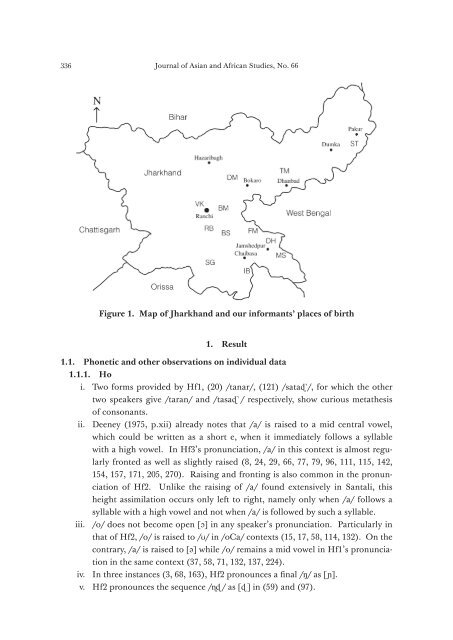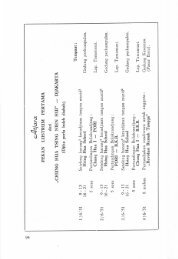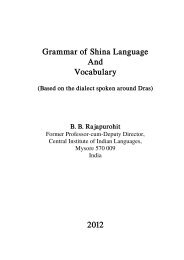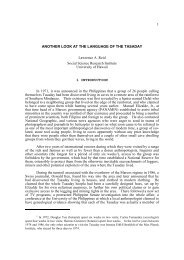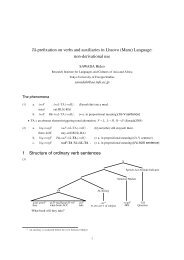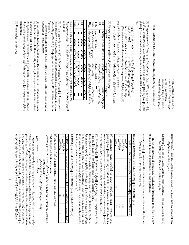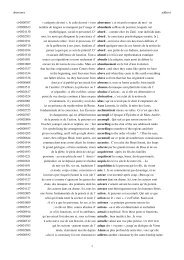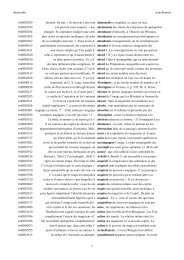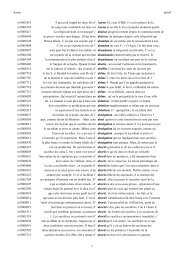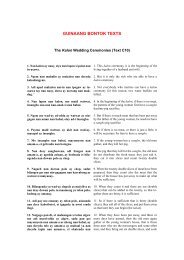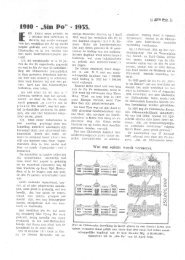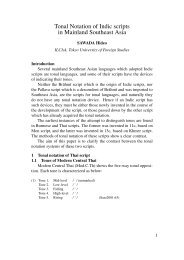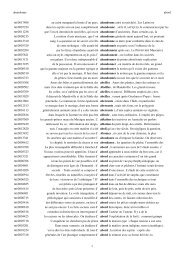- Page 1 and 2:
論 文 目 次 Paguyuban Pasun
- Page 3 and 4:
【 論 文 】 Journal of Asian an
- Page 5 and 6:
) ) ) )
- Page 7 and 8:
2. 1061/1651 年 のワクフ 証
- Page 9 and 10:
Salīmā ) ( )
- Page 11 and 12:
図 2 古 集 会 モスク 1 階
- Page 13 and 14:
Reżā - ) 文 書 2
- Page 15 and 16:
) 4.2.2 シェイフ
- Page 17 and 18:
) )
- Page 19 and 20:
(taÝziyedārān)
- Page 21 and 22:
史 料 略 号 ÝAbd al-Ghaffār:
- Page 23 and 24:
【Article】 Journal of Asian and
- Page 25 and 26:
E, Edi S.: Paguyuban Pasundan: A Su
- Page 27 and 28:
E, Edi S.: Paguyuban Pasundan: A Su
- Page 29 and 30:
E, Edi S.: Paguyuban Pasundan: A Su
- Page 31 and 32:
E, Edi S.: Paguyuban Pasundan: A Su
- Page 33 and 34:
E, Edi S.: Paguyuban Pasundan: A Su
- Page 35 and 36:
E, Edi S.: Paguyuban Pasundan: A Su
- Page 37 and 38:
E, Edi S.: Paguyuban Pasundan: A Su
- Page 39 and 40:
E, Edi S.: Paguyuban Pasundan: A Su
- Page 41 and 42:
E, Edi S.: Paguyuban Pasundan: A Su
- Page 43 and 44:
E, Edi S.: Paguyuban Pasundan: A Su
- Page 45 and 46:
E, Edi S.: Paguyuban Pasundan: A Su
- Page 47 and 48:
E, Edi S.: Paguyuban Pasundan: A Su
- Page 49 and 50:
E, Edi S.: Paguyuban Pasundan: A Su
- Page 51 and 52:
E, Edi S.: Paguyuban Pasundan: A Su
- Page 53 and 54:
E, Edi S.: Paguyuban Pasundan: A Su
- Page 55 and 56:
that Rama VI’s expectations were
- Page 57 and 58:
) - ) )
- Page 59 and 60:
) (Scouting for Boys)
- Page 61 and 62:
) ) ()
- Page 63 and 64:
) () (dek klaang thanon)
- Page 65 and 66:
表 4 『スアパー 精 神 を
- Page 67 and 68:
図 2 ルークスア 加 盟 員
- Page 69 and 70:
( ) )
- Page 71 and 72:
本 研 究 のまとめと 今 後
- Page 73 and 74:
参 考 文 献 《タイ 語 文
- Page 75 and 76:
【 論 文 】 Journal of Asian an
- Page 77 and 78:
地 図 1 インドネシア 共
- Page 79 and 80:
(wakutuna La Elangi ) (wakutuna
- Page 81 and 82:
地 図 3 クラトン・ウォリ
- Page 83 and 84:
(Rosaldo ) (Nah Mbosyi
- Page 85 and 86:
) ( p) ( )
- Page 87 and 88:
(Masjid Agung Keraton)
- Page 89 and 90:
( ibid ibid) Kao-shing Yikhumishi
- Page 91 and 92:
() La
- Page 93 and 94:
資 料 1 ブトン 王 国 歴 代
- Page 95 and 96:
(Todanga) (Batauga)(Waoangi) (Ju
- Page 97 and 98:
- (Erringt
- Page 99 and 100:
(ibid) (Tobunku) (Andaya p)
- Page 101 and 102:
) (Tolandona) (Kamaru)
- Page 103 and 104:
資 料 2 カンボルンボルの
- Page 105 and 106:
) (lalaki ) () ) La HZRN
- Page 107 and 108:
(Wabula ) (Lapandewa )(Watumatobe
- Page 109 and 110:
( Simbolisumu) ) Ć ) (Wolio s
- Page 111 and 112:
( ) ( p) ()
- Page 113 and 114:
付 記
- Page 115 and 116:
Transcriptie van hetdagboek der vor
- Page 117 and 118:
【 論 文 】 Journal of Asian an
- Page 119 and 120:
(Nyambene District) ) (Igembe) (mwi
- Page 121 and 122:
Ⅱ ギチアロ 関 係 の 現
- Page 123 and 124:
( )
- Page 125 and 126:
( ) 2 ムガンビの 脅
- Page 127 and 128:
(nthenge ya mburi iyili) (nkiri
- Page 129 and 130:
(ntrume ya uturia ina muku nyumba)
- Page 131 and 132:
( p) ( pp-) ( ) 4 4
- Page 133 and 134:
Ⅲ ギチアロ 関 係 の 過
- Page 135 and 136:
(war brothers related by common blo
- Page 137 and 138:
) (Neumann p) (Neumann pp-)
- Page 139 and 140:
4 4 4 4 (Beidelman p)
- Page 141 and 142:
(White p) (White p)
- Page 143 and 144:
Meru District in the Kenyan Spatial
- Page 145 and 146:
Journal of Asian and African Studie
- Page 147 and 148:
Journal of Asian and African Studie
- Page 149 and 150:
Journal of Asian and African Studie
- Page 151 and 152:
Journal of Asian and African Studie
- Page 153 and 154:
Journal of Asian and African Studie
- Page 155 and 156:
Journal of Asian and African Studie
- Page 157 and 158:
Journal of Asian and African Studie
- Page 159 and 160:
Journal of Asian and African Studie
- Page 161 and 162:
Journal of Asian and African Studie
- Page 163 and 164:
Journal of Asian and African Studie
- Page 165 and 166:
Journal of Asian and African Studie
- Page 167 and 168:
Journal of Asian and African Studie
- Page 169 and 170:
Journal of Asian and African Studie
- Page 171 and 172:
Journal of Asian and African Studie
- Page 173 and 174:
Journal of Asian and African Studie
- Page 175 and 176:
Furthermore, tone melody (TM), asso
- Page 177 and 178:
1. は じ め に (Eki-Kwaya)
- Page 179 and 180:
oku-rora (to see) oku-bhuruka (to j
- Page 181 and 182:
() H () oku-sya oku-rora oku-bhur
- Page 183 and 184:
()() i:-ka () -ra:ta () ama-si:na (
- Page 185 and 186:
TBU TBU 2.2. 不 定 形 + 名
- Page 187 and 188:
(a) ni+V (N) → nV (N) (ni+V (N
- Page 189 and 190:
d * * b * * AC ni+ki-saru → n
- Page 191 and 192:
() H φ → * / Noun + [ _ ] DemP
- Page 193 and 194:
omu-múró mú-bhí:bhi ~ omu-múr
- Page 195 and 196:
() * AC -bhi:bhi → -bhi:bhi
- Page 197 and 198:
LH L TBU H TBU LH ni LH
- Page 199 and 200:
付 表 : 音 調 規 則 ほかの
- Page 201 and 202:
【 論 文 】 Journal of Asian an
- Page 203 and 204:
簡 略 表 記 Ad Dem N V I IV
- Page 205 and 206:
H H L ni ni LH
- Page 207 and 208:
H (c) (TM) HL H TBU (())(d)
- Page 209 and 210:
* AC * X oku-bi:ka → oku-bi:ka
- Page 211 and 212:
X HL H X (()) () HL HL → H / *
- Page 213 and 214:
2. 名 詞 の 音 調 形 2.1. 幾
- Page 215 and 216:
H L 4) L H-F H L 5
- Page 217 and 218:
* AC X ama-baruka → ama-baruka
- Page 219 and 220:
− -a(C)V A (C )V-a (C )i-a(C
- Page 221 and 222:
⇒ echikokóra échi-néne (big el
- Page 223 and 224:
() HL HL → H / * ùúúû X + Y
- Page 225 and 226:
H X ()ni ni [o → ni [o LH L
- Page 227 and 228:
c X HL H () HL () * * oo → oo
- Page 229 and 230:
付 表 :ジタ 語 音 調 規 則
- Page 231 and 232:
()ni ni [o → ni [o L H LH B.
- Page 233 and 234:
Journal of Asian and African Studie
- Page 235 and 236:
Journal of Asian and African Studie
- Page 237 and 238:
Journal of Asian and African Studie
- Page 239 and 240:
Journal of Asian and African Studie
- Page 241 and 242:
Journal of Asian and African Studie
- Page 243 and 244:
Journal of Asian and African Studie
- Page 245 and 246:
Journal of Asian and African Studie
- Page 247 and 248:
(OOPP) (DDFF HHKKMMNNQQRR) (AAS
- Page 249 and 250:
表 1 ANCI で 採 用 されてい
- Page 251 and 252:
) ANCI BB BB ( )
- Page 253 and 254:
HH % OO PP % DDQQRR %
- Page 255 and 256:
(sous-série ) () EE() EE
- Page 257 and 258:
(communes de plein exercice)(commun
- Page 259 and 260:
(patentes de santé et arraisonneme
- Page 261 and 262:
2Q 工 業 (Industrie) (usines)(art
- Page 263 and 264:
セリー 1 9 5 3 年 政 令 の
- Page 265 and 266:
表 8-2 ANCI 独 自 の 下 位
- Page 267 and 268:
O PP P ( - OOPP) OOPP (
- Page 269 and 270:
表 9 ANCI 収 蔵 資 料 数 ()
- Page 271 and 272:
【 資 料 ・ 研 究 ノート
- Page 273 and 274:
() yazawing Cushing racaw
- Page 275 and 276:
() KhunTaaypong ()CawTaawnöykh
- Page 277 and 278:
() CawPaan:nöy CawTaawkhaang mä
- Page 279 and 280: () löt (Kham:lötpaangmana) () (
- Page 281 and 282: () (p) 3. 王 のいない 時
- Page 283 and 284: () Naang:Haankhüncö: ) Mä
- Page 285 and 286: () KhunPaaksälong KhunPaaks
- Page 287 and 288: () 8.1. 対 中 関 係 Mäng:Maa
- Page 289 and 290: () kyaap ) () Cawphal
- Page 291 and 292: () Mäng:Naay: Mäng: Naay:
- Page 293 and 294: () (p) () () Sët sëng won
- Page 295 and 296: 【 資 料 ・ 研 究 ノート
- Page 297 and 298: TT 2) TT p p ( ) Ngô S
- Page 299 and 300: NVH Nguyễn Văn Huyên 14)
- Page 301 and 302: TT NVH NVH Ngô ế Long pp-
- Page 303 and 304: 図 4 A4 本 巻 二 十 , 第 一
- Page 305 and 306: 表 1 A4 本 対 照 表 H G T (VHc
- Page 307 and 308: 表 2 避 諱 表 A A A
- Page 309 and 310: 表 3 TT 諸 本 対 照 表 NVH
- Page 311 and 312: NVH NVH ( A ) NVHA
- Page 313 and 314: Nguyễn Ðổng Chi Ðại Việt
- Page 315 and 316: Journal of Asian and African Studie
- Page 317 and 318: Journal of Asian and African Studie
- Page 319 and 320: Journal of Asian and African Studie
- Page 321 and 322: Journal of Asian and African Studie
- Page 323 and 324: Journal of Asian and African Studie
- Page 325 and 326: 【Source Materials and Remarks】
- Page 327 and 328: K, M. et al.: A Survey of the Diale
- Page 329: K, M. et al.: A Survey of the Diale
- Page 333 and 334: K, M. et al.: A Survey of the Diale
- Page 335 and 336: K, M. et al.: A Survey of the Diale
- Page 337 and 338: K, M. et al.: A Survey of the Diale
- Page 339 and 340: K, M. et al.: A Survey of the Diale
- Page 341 and 342: K, M. et al.: A Survey of the Diale
- Page 343 and 344: K, M. et al.: A Survey of the Diale
- Page 345 and 346: K, M. et al.: A Survey of the Diale
- Page 347 and 348: K, M. et al.: A Survey of the Diale
- Page 349 and 350: K, M. et al.: A Survey of the Diale
- Page 351 and 352: K, M. et al.: A Survey of the Diale
- Page 353 and 354: K, M. et al.: A Survey of the Diale
- Page 355 and 356: K, M. et al.: A Survey of the Diale
- Page 357 and 358: K, M. et al.: A Survey of the Diale
- Page 359 and 360: · M v Ì 1. ´eÉÍCuWƒ[i‹´ev
- Page 361: Articles CONTENTS e Old Friday Mosq


